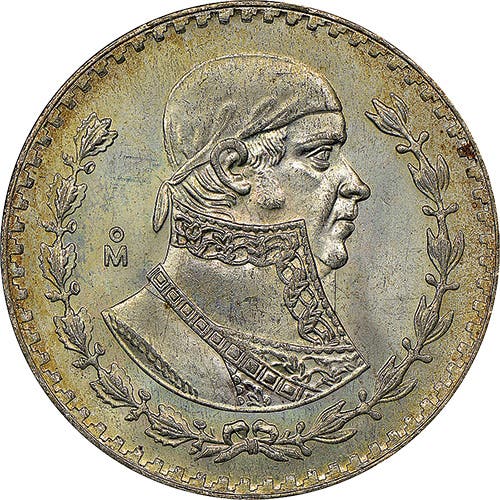Indiana Government’s Confusion Over Sales Tax Exemption
The Indiana Department of Revenue this month released a bulletin titled “Sales Tax Information Bulletin #50.” This bulletin discusses Indiana’s sales and use tax exemptions for the retail sales of…
The Indiana Department of Revenue this month released a bulletin titled “Sales Tax Information Bulletin #50.” This bulletin discusses Indiana’s sales and use tax exemptions for the retail sales of bullion and legal tender. In reading through this bulletin, I found one issue where there was contradictory information about “U.S. Liberty Gold Coin.” I also found that the bulletin does not necessarily concur with the language of the Indiana Code. To give readers an understanding of the confusion, here is a copy of the letter I sent this week to Bob Grennes, Indiana’s Commissioner of the Department of Revenue.
I’ll let readers know of any response I receive.
Dear Commissioner Grennes:
I write to request a resolution of the discrepancy between Indiana Code 6.25-5-47 (available online at https://iga.in.gov/legislative/laws/2022/ic/titles/006#6-2.5-5-47) which became law in 2016 and the April 2023 Indiana Department of Revenue Sales Tax Information Bulletin #50 (available online at https://www.in.gov/dor/files/sib50.pdf).
I am writing as an individual. This is not an official communication of any organization or my employer. I am not an attorney, but cite my information as a lay person.
The Code section reads: “Sec. 47. Transactions involving the sale of or the lease or rental of storage for:
(1) coins that are permitted investments by an individual retirement account or by an individually-directed account under 26 U.S.C. 408(m);
(2) bullion that would be a permitted investment by an individual retirement account or by an individually-directed account under 26 U.S.C. 408(m) if the bullion was in the physical possession of a trustee; or
(3) legal tender;
are exempt from the state gross retail tax.”
The second paragraph under the Introduction of Sales Tax Information Bulletin #50 begins: “Transactions involving the sale of coins or bullion are exempt from sales tax if the coins or bullion are permitted investments by an individual retirement account (“IRA”) or by an individually-directed account (“IDA”) under 26 U.S.C. 408(m). Transactions involving the sale of legal tender are always exempt from sales tax, even if sold at more than face value.”
The fourth paragraph under the Introduction of Sales Tax Information Bulletin #50 reads: “To be exempt from sales tax, coins (other than legal tender) and bullion are not required to be held by an IRA or IDA. Rather, the exemption applies to coins or bullion that are permitted to be held by an IRA or IDA.”
At the end of the Exempt Bullion section of Sales Tax Information Bulletin #50 it reads: “NOTE: The following examples of rare coins are “collectibles” under 26 U.S.C. 408(m). Because “collectibles” are not permitted investments by an IRA or by an IDAs, transactions involving the sale of the following coins do not qualify for Indiana’s sales tax exemption and remain subject to tax. Austrian Corona Italian 20 Lira Belgian 20 Franc Mexican 20 Peso British Britannia South African Krugerrand Chilean 100 Peso Swiss 20 Franc Dutch 10 Guilder U.S. Buffalo Proof French 20 Franc U.S. Liberty Gold Coin Hungarian 100 Korona Other Collectible or Rare Coins”
Under the Legal Tender section of Sales Tax Information Bulletin #50, it reads: “Indiana law provides a sales tax exemption for transactions involving the purchase of legal tender. “Legal tender” means all United States coins and currency, regardless of age or date of circulation, including Federal Reserve Notes and circulating notes of Federal Reserve Banks. Foreign gold and silver coins are not legal tender. NOTE: Foreign circulating currency obtained through an exchange of currency at a bank or “Currency Exchange” is typically obtained through a like kind exchange. Transactions in which foreign currency is obtained through a like kind exchange are not subject to sales tax. Common examples of like kind exchanges include, but are not limited to, the exchange of U.S. dollars for an equivalent amount euros, pesos, yen, pounds, francs, Canadian dollars, or yuan.”
The focus of the discrepancy is that the Indiana Department of Revenue has used a definition of “legal tender” in the Bulletin that is different than stated in the Code, as demonstrated in the statutes of other states.
Example: Michigan Compiled Law Section 205.54s (available online at http://www.legislature.mi.gov/(S(rfu14spfw3xuqn35gqnyc5bc))/mileg.aspx?page=getObject&objectName=mcl-205-54s) states: “(b) “Investment coins” means numismatic coins or other forms of money and legal tender manufactured of gold, silver, platinum, palladium, or other metal and issued by the United States government or a foreign government [emphasis added] with a fair market value greater than the face value of the coins.”
Example: Tennessee SUT-121 (available online at https://revenue.support.tn.gov/hc/en-us/articles/360058685571-SUT-121-Bullion-or-Precious-Metal-Coins) states: “Effective May 27, 2022, there is a sales and use tax exemption for the sale of all coins, currency, and bullion that are:
• manufactured in whole or in part from gold, silver, platinum, palladium, and other material;
• used solely as legal tender, security, or commodity in Tennessee or another state, the United States, or a foreign nation [emphasis added]; and
• sold based primarily on their intrinsic value as precious material or collectible items rather than their representative value as a medium of exchange.
Example: An Illinois 2021 General Information Letter (available online at https://tax.illinois.gov/content/dam/soi/en/web/tax/research/legalinformation/letterrulings/st/documents/2021/st21-0006-gil.pdf) states in part: “Notwithstanding the fact that the sales may be at retail, gross receipts from the sales of legal tender, currency, medallions, or gold or silver coinage issued by the State of Illinois, the government of the United States of America, or the government of any foreign country [emphasis added], and bullion are exempt from Retailers’ Occupation Tax. See 120 ILCS 2-5(18); 86 Ill. Adm. Code 130.1910(c); Section130.120(aa). This exemption applies even if these items have appreciated in value and have become rare and are unlikely to be used in today’s commerce. Note, however, when a government or entity that is not listed in the statute issues a coin or similar item, it is subject to tax pursuant to Section 130.1910(a). For example, commemorative medallions minted by private businesses or other states would be subject to tax.”
Example: North Carolina Statutes Section 105.164.13(69) (available online at https://www.ncleg.net/enactedlegislation/statutes/html/bysection/chapter_105/gs_105-164.13.html) states in part: “ (69) Sales of non-coin currency, investment metal bullion, and investment coins. For purposes of this subdivision, the following definitions apply:
a. Investment coins. - Numismatic coins or other forms of money and legal tender manufactured of metal under the laws of the United States or any foreign nation with a fair market value greater than any statutory or nominal value of such coins.
When the bill was in the Indiana legislature to adopt this sales and use tax exemption, I spoke before a legislative committee hearing in support of this bill, which is now law. I have met with bureaucrats, testified before legislative committees, or provided written documentation in support of precious metals bullion, coins, and currency sales and use tax exemptions that have been enacted or expanded in seventeen states. I am not aware of any statute in any other state that provides a sales or use tax exemption for legal tender that limits the exemption only to United States legal tender.
There is at least one state, Florida—see Section 12A-1.0371, where the statute does distinguish different sales and use tax treatment between US legal tender and other legal tender, but that language is explicit in the statute. This is different than the Indiana statute, which has no such distinguishing language. Since there is no distinguishing language in the statute between US and other legal tender, I think Indiana should match the definitions of other states to include all legal tender of Indiana, the United States, or any foreign government.
Indiana imposes a sales and use tax on tangible personal property unless otherwise exempted. One purpose of the precious metals and legal tender sales tax exemption in Indiana was to recognize that such assets are not “consumption” assets on which sales and use taxes generally apply. Instead, they are “capital” assets akin to intangible assets such as shares of precious metals mining companies, shares of precious metals exchange traded funds, precious metals futures and options contracts on commodity exchanges, and the like. These are investments subject to income taxes at the time they are resold. Obviously, it is not fair to tax the same property as both a consumption item that is consumed and as a capital item for resale that is not consumed.
The Bulletin acknowledges the nature of precious metals bullion and legal tender being capital assets when it quotes from Internal Revenue Service regulations on the income tax treatment from the resale of “collectibles.” However, the discussion of capital gains income taxes on “collectibles” in the Bulletin is misleading. Several assets such as US Gold, Silver, Platinum, and Palladium Eagle coins that are eligible to be purchased inside an Individual Retirement Account are also taxed under the same “collectibles” provisions as the coins listed in the Bulletin as being legal tender not qualifying for a sales and use tax exemption in Indiana. In a sense, any reference to the capital gains income tax rates on “collectibles” has no application in sales and use tax laws and regulations.
By the way, several coins identified in the Bulletin as not being exempt from Indiana sales and use tax, before 1857, did have legal tender status in the US and actually circulated as a medium of exchange in America. That includes the Belgian 20 Franc, Dutch 10 Gulden (Guilder), and French 20 Franc.
One other issue that the Bulletin did not address was that most buyers of exempt bullion and legal tender are intending to resell the items on the wholesale market. As I understand it, if a person purchases bullion and legal tender in Indiana with the intent at some point in the future to resell it on the wholesale market (often back to the same business from which it was purchased), then that person can register with the Indiana Department of Revenue for a resale certificate that would exempt them from having to pay sales or use tax when they purchase such items. Is this accurate?
The Bulletin does have two points that contradict each other. In the section under Exempt Bullion where it states examples of rare coins that “do not quality for Indiana’s sales tax exemption and remain subject to tax,” it includes U.S. Liberty Gold Coin. In the very next section, under Legal Tender, it states: “Legal tender” means all United States coins and currency, regardless of age or date of circulation . . . . That means that U.S. Liberty Gold Coin would be exempt from sales tax. At a minimum, the Bulletin should be corrected to remove “U.S. Liberty Gold Coin” from the list of sales taxable merchandise.
As a last point, in the Bulletin paragraph under Legal Tender, it notes that there is a sales tax exemption for transactions involving the purchase of all United States coins and currency, regardless of age or date of circulation, including Federal Reserve Notes and circulating notes of the Federal Reserve Banks. There can be some arguments made that Federal Reserve Notes and circulating notes of the Federal Reserve Banks are not US government-issued legal tender, though they do have legal tender status in the US. However, by discussing Federal Reserve Notes by name, it may be prudent to also affirm that US government-issued legal tender such as Silver Certificates, United States Notes, Gold Certificates, National Currency, and the other legal authorities of currency issued by the US government are also exempt from Indiana sales tax.
It is my hope that Bulletin #50 can be revised to eliminate the one point of self-contradiction and to correct the information to better conform to the language of the Indiana Code as well as provisions in the statutes of other states. If there is anything I can do to assist you with this process, please contact me.
Sincerely,
Patrick A. Heller
Communications Officer
Patrick A. Heller was honored as a 2019 FUN Numismatic Ambassador. He is also the recipient of the American Numismatic Association 2018 Glenn Smedley Memorial Service Award, 2017 Exemplary Service Award, 2012 Harry Forman National Dealer of the Year Award and 2008 Presidential Award. Over the years, he has also been honored by the Numismatic Literary Guild (including in 2021 for Best Investment Newsletter), Professional Numismatists Guild, Industry Council for Tangible Assets and the Michigan State Numismatic Society. He is the communications officer of Liberty Coin Service in Lansing, Mich., and writes Liberty’s Outlook, a monthly newsletter on rare coins and precious metals subjects. Past newsletter issues can be viewed at www.libertycoinservice.com. Some of his radio commentaries titled “Things You ‘Know’ That Just Aren’t So, And Important News You Need To Know” can be heard at 8:45 a.m. Wednesday and Friday mornings on 1320-AM WILS in Lansing (which streams live and becomes part of the audio archives posted at www.1320wils.com).









